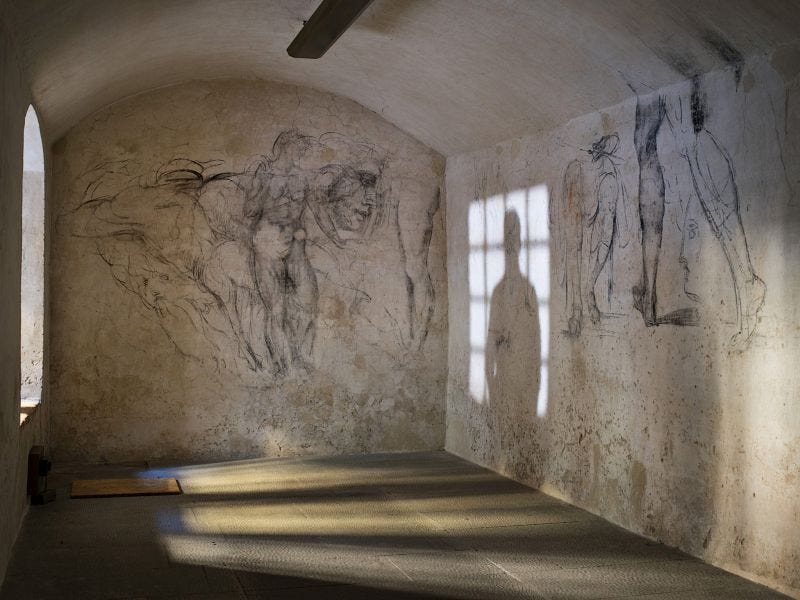Prank Call or Hybrid War?
Plus, reforming the Constitution and an Ode to Naples
Another week and another diplomatic mess for Georgia Meloni’s government. Though this time the cause came from an unlikely source. On Wednesday, two Russian “pranksters” called Vovan and Lexus (real names Vladimir Kuznetsov and Aleksej Stoljarov) set-up a “fake” phone interview with the Italian PM Giorgia Meloni in which they posed as two politicians from the African Union, a 55-member bloc. The conversation began with one of the comics complaining that “their continent” is suffering due to the EU’s diversion of funds towards the Ukraine war. Meloni seemed to take the bait. “To tell the truth,” she said, “I see a lot of tiredness on all sides. We may be reaching the moment when everyone realizes we need a way out.” Later in the chat Meloni went on to reveal that the Ukranian counteroffensive “isn’t going the way we hoped” and that she has “a few ideas on the table,” to put out there “when the time is right.” The fallout is still unfolding. The Italian government insists Kyiv still has its “full support” and has labelled the Russian prank “an act of hybrid war” and “desperate bit of propaganda”. Opposition parties are calling for the immediate resignation of the Palazzo Chigi administrators that failed to vet the speakers, and a full-scale parliamentary inquiry into how this blunder was allowed to take place seems to be on the cards. The damage, however, is already done. European allies are understandably furious with Meloni’s leak of sensitive information, and her government will now, surely, face the consequences on the international stage.
Tomorrow afternoon, lawmakers will examine the first draft of a Constitutional Reform bill that - if it passes - could fundamentally alter the Italian political system. There are, two major proposals. The first calls for an end to the current ‘senators for life’ system, which enables the President of the Republic to allocate five individuals per term to join the legislature on the basis of “outstanding patriotic merits in the social, scientific, artistic or literary field.” Such senators remain independent from party groups, offering independent contributions to the political process. The second, more controversial, proposal is for the Italian public to directly elect the country’s Prime Minister (with 55% majority required as a valid result). This is quite different to the current system, in which, after a vote, the various parties form a ruling majority and nominate a PM internally before passing the name to the President for the final approval. Defenders of the reforms argue they are “more democratic” and could “stabilize” a notoriously unstable political system. The opposition (on both sides of the aisle) argue the bill would undermine the checks and balances of the 1948 constitution which were put in place to prevent any single individual wielding too much power. This is a huge gamble by Meloni, and it could be a make-or-break issue for the government as whole. Watch this space for further updates.

Speaking of intrigue and power: last week David Runciman released the latest edition of his excellent ‘Past, Present, Future’ podcast, and it’s dedicated to none other than the great Italian intellectual Umberto Eco. Runciman hones in specifically on Eco’s 2010 essay ‘Thoughts on WikiLeaks,’ which, title aside, is as much a theory of conspiracy as it is an analysis of that epoch defining social phenomenon. In the essay, Eco provides some fascinating reflections on the philosophical meaning of a “true scandal” in the public sphere, and offers his own analysis of what transparency, control and ‘freedom of information’ really mean in the age of digital technologies. If you’re an Eco fan, as I am, you’ll enjoy this great deep dive into one of his little read but fascinating essays. If you’re not, or are unfamiliar with his work, the conversation is still well-worth a listen for its clear, acerbic reflections on the ontological and epistemological conventions that shape contemporary discourse. Listen back, and subscribe here.
Arts and culture: the spirit of revolt
Big news from Florence this week: a “secret room,” where Michelangelo apparently spent two years of his life in hiding, is about to be opened to the public. The basement, which is located under the Medici chapels in San Lorenzo, is said to be decorated with “doodles” that the artist made in chalk and charcoal when he was forced into subterfuge for his involvement in a political revolt against his one-time patrons in 1527. The images include “memories” of some of the figures from the Sistine Chapel, schematic David-esque drawings and a full-blown sketch of Lela and the Swan. In the words of Paola D’Agostino, the director of the Bargello Museums, “it was as if the artist had wanted to produce a catalogue of his works, not knowing whether he would emerge from the chamber dead or alive… he drew things from the past as if he was taking a trip down memory lane … it was like having an album of his works.” The space, which was previously only accessible by art historians, will be included in the general entrance ticket to the San Lorenzo crypt starting 15 November.
Film director Trudie Styler has got a new documentary out about Naples which looks well-worth a watch. ‘Posso entrare? An Ode to Naples’ is a love letter to the history, culture, street life and unique politics of one of Italy’s most complex, fascinating, beautiful and contested cities. Featured interviewees include Roberto Saviano, who offers his thoughts not only on the mafia but seemingly his love for “the last of the ancient cities”, Clementino, the rapper, chips in on the local music scene, and several activists provide their take on anti-fascism, anti-racism and the struggle against poverty and organised crime. Naples is a city that’s often stigmatised, looked-down-on in classist terms as the emblem of the Italian state’s failures. While the city, like any city, has its fair share of problems, this documentary seems to offer a much-needed counter narrative; that despite everything, Naples’s distinct identity provides those who live there with a resilience, creativity and vitality that’s hard to find anywhere else. The film is out on 6 November. In the meantime you can check out the trailer below [click bottom right for ENG subs].
Recipe: Florentine Ribollita
The clocks have changed, the days are getting shorter, the rains are here with a vengeance and the temperatures are finally starting to drop. Ragazzi, minestra season has arrived. Of all the Italian soups to see in this greyer period of the year, one in particular stands front and centre in my mind: the classic Florentine soup known as ribollita. Now, some terrible crimes have been committed in the name of this dish. Flicking through google you’re highly likely to find images of watery broths with a few cannellini beans, veg and greens floating around. Yuck! This has got nothing to do with the real thing. Ribollita, which means “reboiled” in Italian, should be thick like porridge. It’s stodgy, hearty and intensely flavoured; ideally topped with gallons of new season olive oil. It also happens to be extremely cheap to make, and, like most cucina povera dishes, it lends itself particularly well to batch cooking. A few years ago Emiko Davies shared a recipe on her blog which is taken directly from Pellegrino Artusi’s 1891 classic Science in the Kitchen and the Art of Eating Well. Quality assurance guaranteed, then. If you’re looking for a hearty but nutritious meal, this is the one for you.
About Me
My name is Jamie Mackay (@JacMackay) and I’m an author, editor and translator based in Florence. I’ve been writing about Italy for a decade for international media including The Guardian, The Economist, Frieze, and Art Review. I launched ‘The Week in Italy’ to share a more direct and regular overview of the debates and dilemmas, innovations and crises that sometimes pass under the radar of our overcrowded news feeds.
If you enjoyed this newsletter I hope you’ll consider becoming a supporter for EUR 5.00 per month (the price of a weekly catch-up over an espresso). Alternatively, if you’d like to send a one-off something, you can do so via PayPal using this link. No worries if you can’t chip-in or don’t feel like doing so, but please do consider forwarding this to a friend or two. It’s a big help!


